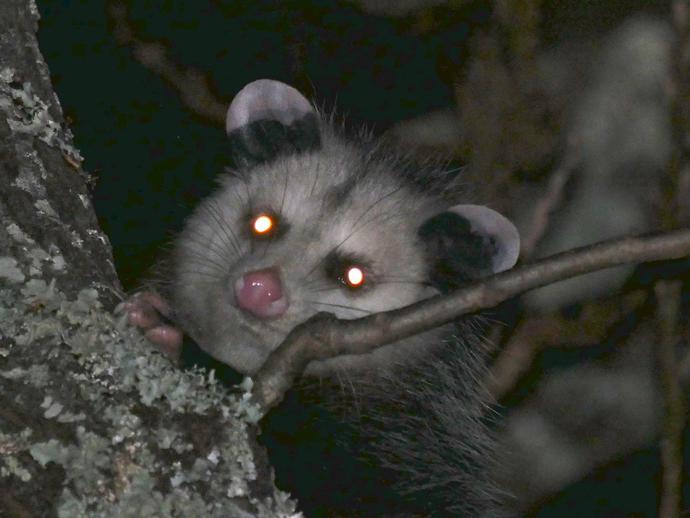February 26, 2021
Ben here with the Friday edition of #BenInNature presented by our friends at Carter Bank & Trust!
Let's close out the week with one of my favorite animals of all time: Didelphis virginiana, the Virginia opossum!
Typically just referred to as "possums," these little guys can be found in the eastern half of the U.S., the west coast of the U.S., and in Mexico and parts of Central America. They're marsupials, which means they carry their young in a pouch, and they're the only native marsupial in the U.S.!
Female possums have between one and three litters of young per year with an average litter size of 8-9 babies. When they're first born, baby possums are about the size of honeybees! These tiny babies will crawl into the mother's pouch, latch onto one of her 13 nipples, and hang out for a couple of months. When they're a little larger, they'll crawl onto the mother's back and hitch a ride with her for a few more months, during which time she'll teach them valuable possum life skills (such as the location where I throw out old food).
Possums are omnivorous, and it will probably come as no surprise that they'll eat just about anything. In the wild, they eat plants, fruit, insects and other invertebrates, fish, eggs, amphibians, reptiles, small mammals, and even carrion.
One of their favorite foods, however, are ticks, which is one of the main reasons that possums deserve our respect and gratitude. Possums are believed to eat 95 percent of the ticks they encounter, and a single possum can eat as many as 5,000 ticks in a single season! This is yet another piece of evidence to support my position that people who don't like possums are wrong.
Of course, one of the most famous traits of the possum is its ability to fake its own death. Unlike humans, they don't do this to skip out on gambling debts; instead, they do it to deter predators! If a possum feels threatened, it will bare its teeth, snap its jaws, and hiss and drool. If this doesn't work, the possum will fall over on its side with its eyes and mouth open, and its heart rate will slow and its breathing will become shallow. This isn't a conscious decision on the possum's part; it's actually an involuntary response to fear. It's often effective, however!
I spotted this particular possum after I had a couple of friends over a few weeks back (masked and socially distanced, of course). Their dog Trixie caught wind of this possum and chased it up my walnut tree. The photo isn't great since it was dark out, but I still think it really captures the possum's overall sense of irritation about the whole thing.
ABOUT #BenInNature
Social distancing can be difficult, but it presents a great opportunity to become reacquainted with nature. In this series of posts, Administrator of Science Ben Williams ventures outdoors to record a snapshot of the unique sights that can be found in the natural world. New updates are posted Monday - Friday, with previous posts highlighted on the weekends. This series of posts is made possible thanks to the support of VMNH Corporate Partner Carter Bank & Trust (www.cbtcares.com)
NATURE PHOTO IDENTIFICATIONS
If you discover something in nature that you would like help identifying, be sure to message us right here on Facebook with a picture (please include location and date of picture) and we'll have our experts help you identify it!

 Hours & Admissions
Hours & Admissions Directions
Directions

